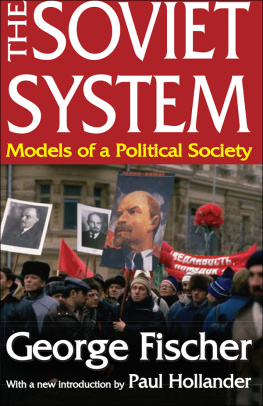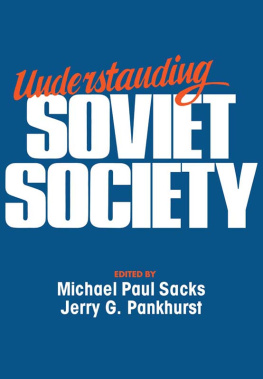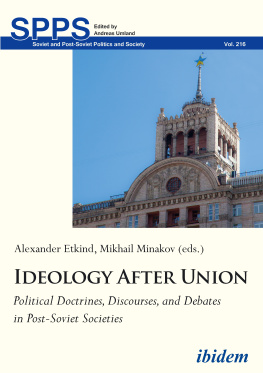Originally published in 1968 by Atherton Press
Published 2012 by Transaction Publishers
Published 2017 by Routledge
2 Park Square, Milton Park, Abingdon, Oxon OX14 4RN
711 Third Avenue, New York, NY 10017, USA
Routledge is an imprint of the Taylor & Francis Group, an informa business
New material this edition copyright 2012 by Taylor & Francis.
All rights reserved. No part of this book may be reprinted or reproduced or utilised in any form or by any electronic, mechanical, or other means, now known or hereafter invented, including photocopying and recording, or in any information storage or retrieval system, without permission in writing from the publishers.
Notice:
Product or corporate names may be trademarks or registered trademarks, and are used only for identification and explanation without intent to infringe.
Library of Congress Catalog Number: 2011029470
Library of Congress Cataloging-in-Publication Data
Fischer, George, 1923-
The Soviet system : models of a political society / George Fischer ; with a new introduction by Paul Hollander.
p. cm.
Previously published under title: Soviet system and modern society.
Includes bibliographical references and index.
ISBN 978-1-4128-4275-4 (alk. paper)
1. Executives--Soviet Union. 2. Power (Social sciences) 3. Kommunisticheskaia partiia Sovetskogo Soiuza. 4. Civilization, Modern. I. Title.
HM1261.F57 2011
303.3309470904--dc23
2011029470
ISBN 13: 978-1-4128-4275-4 (pbk)
A book written close to half a century ago is bound to stimulate thoughts of social as well as intellectual change. When this book was written few imagined (its author included) that a quarter century later the Soviet system would no longer exist. While at the present time the former Soviet Union is only of historical interest, the manifestations and unintended consequences of modernization and its relationship to the exercise of political power remain of considerable interest to both social scientists and policy makers. Insofar as the former Soviet Union was a pioneer of a new, state controlled type of modernization, its record may help one to better understand various problems linked to modernization, which are still matters of concern.
A major question that preoccupied George Fischer and other social scientists interested in the Soviet Union in the 1960s was the question of how to conceptualize Soviet society in the post-Stalin period. How thoroughly did the post-Stalin reforms change its character? Was it still a totalitarian system, or only authoritarian? (Fischer actually preferred the term monist to authoritarian or totalitarian.) Did it become more pluralistic and liberal, or was it at least slowly moving in that direction? Did Marxism-Leninism continue to shape Soviet policies and the outlook of Soviet leaders? Was a highly politicized system such as the Soviet system compatible with economic progress? Did the Soviet Union begin to converge with other modern, industrial societies, and if so, in what ways?
There was in those days much discussion and disagreement about the relationship between modernity and the Soviet system and the compatibility of the two. Most American social scientists who paid any attention to the Soviet Union (and there were not many) were inclined to a benign, optimistic view that was informed by a blend of functionalism and plain old-fashioned economic determinism. They believed that following the death of Stalin the Soviet Union embarked on a path of liberalization that was not only congruent with but compelled by modernization that entailed more than rapid industrialization and urbanization. It was held that the very processes of modernization promoted social-political pluralization as it became increasingly difficult to run a complex, modern society by authoritarian, let alone totalitarian, methods. At the same time, we must recall, that the most sweeping policies of technological modernization were introduced during the most authoritarian, most repressive period of Soviet historythe heydays of Stalin.
The major question Fischer sought to resolve was whether or not, or to what degree is modernity compatible with a regimented, authoritarian society such as the Soviet Union was at the time of his writing. Early in the book he writes: If Russia can evolve the type of leader able to direct a vast and ever more complex economy, then the pluralist model may not in fact apply to every modern society. [A] fully modern society might be able to develop along a non-pluralist path [13]. The problem here is that Fischer never tells the reader what he means by a fully modern society.
Fischer sought to find an answer to this and other questions noted above by closely examining the social, ethnic, and educational background and career pattern of 306 top executives who held high-ranking, full-time jobs in the Communist Party [19]. He argued that as their educational attainments and managerial qualifications improved (solid skills in both polity and economy [152]), they proved increasingly capable of running the economy, proving that modern society can fit a monist as well as pluralist model. [148] While this conclusion was premature in the late 1960s (especially in the absence of a clear definition of modernity), post-Maoist China seems to support the proposition for the time being. It remains to be seen how full modernization in China might undermine the existing and apparently stable authoritarian political arrangements.
Fisher was not in a position to ponder the implications of the collapse of the Soviet system for the degree of modernity the Soviet system achieved. It may well be argued that the collapse could be interpreted as a reflection of the failure or insufficiency of modernization, an indication that the Soviet Union was only partially modernized: capable of producing an abundance of tanks, missiles, and nuclear weapons but not enough food, cars, or refrigerators.
The book concludes with a provocative and questionable proposition, namely that we should not tie pluralism to Capitalist Democracy. Whether societies come to be modern in a monist or pluralist way, they need not be like Capitalist Democracy at all. [153] Fisher does not say what a modern pluralist society would be like that is not a capitalist democracy.
But elsewhere he writes that It is too soon to tell just what will happen after noncapitalist political societies outside the West become fully modern. [150] He has also written: In the end the key question still is whether, if the economy becomes so highly differentiated, the social system as a whole can remain monist. [152] Here again the proposition is difficult to evaluate without a clear understanding of what he means by modernity, and especially full modernity. If modernity is thought of as including not only technological progress and its correlatesindustrialization, urbanization, bureaucratizationbut also pluralization, growth of individualism, decline of informal social controls, secularization, weakening of authority, etc., then the Soviet system in the post-Stalin period was far from modern. Even if we focus only on the Soviet economy, its chronic inability to meet the needs of the population for consumer goods and a reliable supply of food raises further question about classifying the Soviet system as modern in the period that concerned Fischer. On the other hand, if we are satisfied with a more limited notion of modernity, then Fischer was right: a monist, authoritarian, highly politicized and regimented society such as the Soviet system did become modern but it did not endure.










